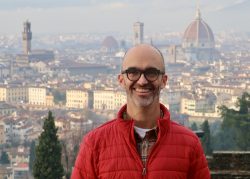Philosophy and La Dolce Vita
By: Erik Schmidt, Professor of Philosophy, Gonzaga University
Friends and family often respond to the news that I am teaching in Florence with visions of gelato, art, and relaxing afternoons in the Tuscan countryside. To be honest, my wife and I have certainly enjoyed visiting beautiful hilltop towns and our collection of little gelato spoons keeps moving to an ever-larger bowl. But the opportunities of teaching in Florence go far beyond the Italian love for La Dolce Vita or “the sweet life.” As a philosophy professor, teaching in Florence provides a special opportunity to help students relate to the figures and ideas they encounter in my class. I am teaching two classes this fall, Ethics and The Philosophy of Happiness, and both classes reflect the art, culture and history that students experience in Florence.
Ethics explores the resources we have to coordinate large communities of people who are striving to live their visions of the good life. One goal of my class is to see how various features of modern life make that more challenging. Students can see the origins of many of those challenges in Florence. As a class, we have examined Renaissance art to explore the way our relationship to nature, other people, and the possibility of the divine call of grace changed in the early modern world. We have looked at early global exploration and the way encounters with foreign cultures altered moral ideals and ethical practices in Europe. We have looked at the rise of modern science and the way Galileo’s claim that the world is composed of atoms challenged the belief that some things have intrinsic value. We read Pico della Mirandola’s claim that humans were created outside the great chain of being and looked at how that claim is illustrated in Leonardo da Vinci’s famous picture of Vitruvian Man. We asked whether Machiavelli’s vision of politics speaks to the challenges of contemporary political discourse. The city of Florence brings philosophical questions to life.
Since many students travel to other countries during their stay in Florence, we also explored the ethical dimensions of travel, starting with simple questions of motivation and place. Why are many of us drawn to travel to foreign lands? What role does it play in personal formation? How does it fit with our Jesuit Mission? Why do certain cities become major tourist attractions? What impact do travelers have on the people, places, and environments they visit? What responsibility do they bear for those impacts?
Florence also shapes my upper level class on the philosophy of happiness. We started with a range of accounts of happiness that emerge out of the ancient world. So, in addition to visiting the Colosseum and strolling the Roman Forum, students are engaged in an ongoing conversation with the people who lived in the ancient world. Should we devote ourselves with the Epicureans to the highest human pleasures or should we join the Stoics and their pursuit of virtue and self-mastery? Is the best life one that pursues Plato’s mathematical account of inner harmony or Aristotle’s biological account of human achievement and excellence?
So, what about the La Dolce Vita that my friends kept talking about? The happiness class looked at the rise of the Slow Food movement in northern Italy and its expansion into many other areas of life, including work, love, and travel. We also read various critiques offered by Italian economists and political scientists who think La Dolce Vita leads to lower economic opportunities and encourages the acceptance of poor outcomes under a disguise of high and flowery praise. What better place than Florence for students to ask whether La Dolce Vita provides an antidote to the fragmented, distracted multitasking that characterizes many of our busy lives or poses an obstacle to economic growth and individual opportunity.
The goal of student formation shapes everything we do at Gonzaga and study abroad, no matter where our students go, serves that mission by clarifying the way each student’s lived experience connects to the classes they take and the world they inhabit. Being a part of that process here in Florence has been a wonderful opportunity. One I will never forget. And the tasty gelato? Let’s just call it the perfect way to top things off.

